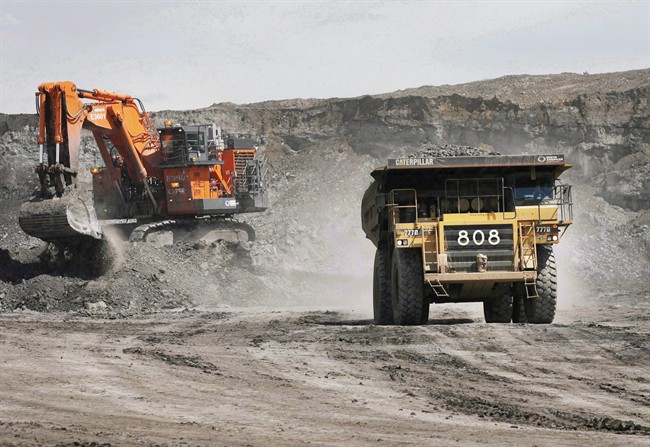Alberta is scaring away oil and gas investment, according to a new Fraser Institute study released Tuesday morning.

The conservative think-tank said it questioned petroleum executives from around the world, and in their view, Alberta and British Columbia are slipping.
Those surveyed were asked 16 questions based on royalties, taxes, trade barriers, environmental regulations and enforcement, quality of infrastructure and geological information, the availability of skilled labour, political stability, the quality of the legal system and security.
Despite a slight improvement in Alberta’s score since 2016, Alberta and B.C. are Canada’s least attractive jurisdictions for investment, the institute says.
More than 50 per cent of survey respondents said Alberta’s taxes deterred investment in the province’s oil and gas sector, among other things.
“Most of our survey respondents blame the tax rates, the tax regime in Alberta, but there’s also a lot of regulatory uncertainty in Alberta due to all the new climate change regulations that have been put in place,” said Kenneth Green, the senior director of the Fraser Institute’s Centre for Natural Resources and co-author of the 2017 Global Petroleum Survey.
READ MORE: How will Alberta’s carbon tax hike hit your home heating bill?
Green said barriers to investment include the high cost to produce Canadian petroleum in comparison to the global price of oil, as well as the carbon tax, a cap on oilsands and methane emissions, and “an aggressive spending plans on climate change that are siphoning off tax dollars to spend on things like home efficiency programs and LED light bulbs and things like that.”
“The priorities are not toward attracting investment, plus we’re still landlocked here. We can’t get to tide water from Alberta to capture the world price of oil,” he said.
READ MORE: Oil patch wants ‘flexibility’ on coming methane cuts or says jobs are at risk
Green said all of the factors combined have caused Alberta to go from being one of the most attractive places — not only in Canada but the world — to 33rd place in the list of 97 jurisdictions.
Four years ago, Alberta was ranked among the top 20 for oil and gas investment.
The rating for B.C. has plummeted since that province elected its NDP government, according to the survey. The province dropped from 39th place out of 96 last year, to 76 out of 97 jurisdictions this year.
The Fraser Institute points to political instability and an openly hostile government. The battle against major energy projects like the Trans Mountain pipeline expansion is shaking investor confidence, the think-tank says.
“All of the governments can do good policy, all of the governments can do bad policy, independent of what party they are from or who the politician is — or the level. So we really look at the policy questions, not the politics and the parties.”
READ MORE: Notley pleads with politicians of all stripes to support Alberta pipeline projects
Since being elected, Alberta Premier Rachel Notley has bucked the NDP trend of decrying oil and gas — instead, pushing hard for pipelines to get Alberta’s product to market. Last week, she gave a speech to the Economic Club of Canada in Ottawa on the importance of the Trans Mountain pipeline expansion.
Days later while speaking to the Calgary Chamber, Notley was thanked for her efforts with a standing ovation from a crowd that greeted her with lukewarm applause just two years ago.
WATCH: Alberta Premier Rachel Notley speaking to the Economic Club of Canada in Ottawa earlier this month
But while her efforts appear to be having an effect among some crowds, it hasn’t necessarily swayed the 333 upstream oil and gas sector senior executives who replied to the institute’s survey. It should be noted, the Fraser Institute’s survey was conducted last spring, from May 23 to July 28.
Elsewhere in Canada, Newfoundland and Labrador was the top-ranked province, moving up from 25th last year to the fourth-most attractive worldwide in 2017.
Saskatchewan slid from fourth-most attractive last year to seventh place this year.
READ MORE: Alberta’s Premier Notley going on tour to sell benefits of Trans Mountain pipeline project
South of the border, six U.S. states rank in the top 10 global jurisdictions: Texas, Oklahoma, North Dakota, West Virginia, Kansas and Wyoming.
The Fraser Institute said because the U.S. administration is pursuing major tax reforms and reducing regulatory red tape for the energy industry, American jurisdictions could be viewed even more favourably in coming years.
“Our hope is that government will look at this report and find what’s deterring investment in Alberta, make some changes to make it more attractive. And help bring back the oil and gas sector in Alberta, to fill up those towers downtown, and get the economy firing and get the unemployement rate down.”
The Institute said the purpose of the study is to create a “guidebook” of sorts for government.
“Where they can look at the 16 different questions we ask people about why they are attracted to investing or deterred from investing. And take the ones that are deterred and compare the ones with the competing jurisdictions and bring policies more into line with your competing jurisdictions in the (United) States and elsewhere.”
While Alberta is lower on the overall list of all regions, it ranked higher on the smaller list of the largest reserve holders in the world. Alberta was ranked third out of the 15, behind Texas and the United Arab Emirates in terms of attractiveness.
- What is a halal mortgage? How interest-free home financing works in Canada
- Boeing reports 1st revenue drop in 7 quarters but beats expectations
- Metro says grocery shoppers still hunting for deals even as inflation eases
- Starbucks looks likely to win U.S. Supreme Court case involving pro-union workers
The least attractive place on that list was Venezuela, where the economy is in tatters amid political uncertainty, high unemployment, civic unrest and one of the world’s highest homicide rates.
READ MORE: Here’s why Venezuela’s political and economic turmoil have spawned deadly protests
A total of 333 respondents participated in the survey this year, in which 160 jurisdictions were asked to be evaluated. They provided enough data to evaluate 97 jurisdictions, which hold 52 per cent of proved global oil and gas reserves and account for 66 per cent of global oil and gas production.
These are the top 10 most-attractive jurisdictions for oil and gas investment, according to the survey:
- Texas
- Oklahoma
- North Dakota
- Newfoundland & Labrador
- West Virginia
- Kansas
- Saskatchewan
- Norway — offshore (except North Sea)
- Wyoming
- South Australia
These 10 areas with the greatest barriers/least attractive for investment:
- Venezuela
- Bolivia
- Libya
- Iraq
- Ecuador
- Indonesia
- California
- Cambodia
- France
- Yemen







Comments